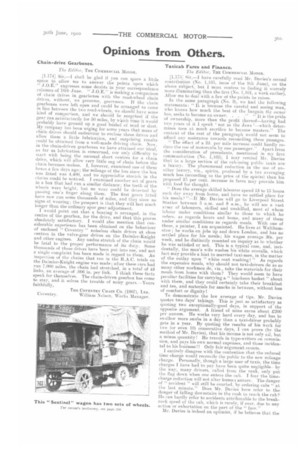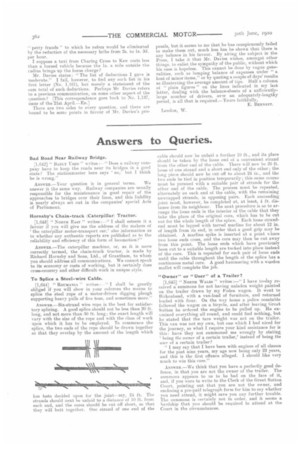Opinions from Others.
Page 17

Page 18

If you've noticed an error in this article please click here to report it so we can fix it.
Chain-drive Gearboxes.
Tim Editor, THE COMMERCIAL MOTOR.
11.174j Sir,-1 shall be glad if you can spare a little space to allow me to answer the points upon which " j.O.E." expresses some doubts in your correspondence columns of 16th June. " J.O.E." is making a comparison of chain drives in gearboxes with the road-wheel chain drives, without, we presume, gearcases. If the chain gearboxes were left open and could be arranged to come in line between the two road-wheels, we should have some kind of comparison, and we should be surprised if the gear ran satisfactorily for 50 miles, by wl4ich rime it would probably have ground up a good bushel of mud or dust. My company has been urging for some years that users of chain drives should endeavour to enclose these drives and allow them a little lubrication, and surprising results could be obtained from a well-made driving chain. Now, in the chain-driven gearboxes we have attained our ideal, so far as lubrication is concerned, our only difficulty to start with being the unusual short centres for a chain drive, which will allow very little sag of chain before the chain becomes useless, 1, however, examined one of these boxes a few days ago ; the mileage of the bus since the box was fitted was 4,400, and no appreciable stretch in the chains could be noticed. I examined another set of gears in a box that hind run a similar distance; the teeth of the wheels were bright, but no wear could be detected by passing one's finger along them. The first gears fitted have now run some thousands of miles, and they show no signs of wearing; the prospect is that they will last much longer than the ordinary spur gear adjustment.
I would point out. that a bearing is arranged, in the centre of the gearbox, for the drive, and that this proves absolutely satisfactory. I would also mention that C071siderable experience has been obtained on the behaviour of enclosed " Coventry " noiseless chain drives at close centres in the valve-gear drives on the. Daimler-Knight and other engines. Any undue stretch of the chain would be fatal to the proper performance of its duty. Some thousands of these drives have been put into use, and not a single complaint has been made in regard to them. An inspection of the chains that ran in the R.A.C. trials on the Daimler-Knight engine was made; after these cars had run 7,000 miles, the chain had stretched, in a total of 43 links, an average of .006 in. per link. I think these facts speak for themselves. The chain-driven gearbox has come to stay, and it solves the trouble of noisy gears.—Yours faithfully, THE COVENTRY CHAIN CO. (1907), Lvn.
Coventry. William Nelson, Works Manager.
Taxicab Fares and Finance.
The Editor, TIIE COMMERCIAL MOTOR.
[1,1751 Sir,--I have carefully read Mr. Davies's second contribution (No. 1,165, issue of the 9th June), on the above subject, but I must confess to finding it scarcely more illuminating than the first (No. 1,1.61, a week earlier). Allow me to deal with a few of the points he raises.
In the same paragraph (No. 3), we find the following statements : " It is because the careful and seeing man, who knows how much the best of the bargain the owner lins, seeks to become an owner. . . ." " It is the pride. of ownership, snore than the profit thereof—having had two years of it 1 speak ' not as the Jews '—which determines men at much sacrifice to become masters." The context of the rest of the paragraph would not seem to afford any assistance towards reconciling these passages.
" The effect of a 2d. per mile increase could hardly reduce the use of motorcabs by one passenger." Apart from the consideration of precedents, mentioned in my first communication (No. 1,166), I may remind Mr. Davies that to a. large section of the cab-using public taxis are a luxury. The phenomenal reduction in the use of another luxury, viz., spirits, produced by a tax averaging much less (according to the price of the spirits) than his proposed 25 per cent. increase in fares may provide him with food for thought.
" Does the average skilled labourer spend 13 to 15 hours each day away from home, and have no settled place for his meals? "—If Mr. Davies will go to Liverpool Street Station between 5 a.m. and 8 a.m., he will see a vast army of labourers, skilled and unskilled, most of whom labour under conditions similar to those to which he refers, as regards hours and home, and many of them under similar conditions as regards meals. With one of these, a. painter, I am acquainted. He lives at Walthamstow ; he works on jobs up and down London, and has no settled place for his meals; his wages average 30s. per week, and he distinctly resented an inquiry as to whether he was satisfied or not. This is a typical ease, and, incidentally, the man's wife washes his white overalls, which fact may provide a hint to married taxi-men, in the matter of the outlay upon " white mat washing! " As regards the expensive meals, why should not taxi-drivers do as so many other workmen do, viz., take the materials for their meals from home with them? They would geHlY1 to have peculiar facilities for carrying a "luncheon basket " about with them, and they could certainly take their breakfast and tea, and materials for snacks in between, without loss of comfort or dignity!
To demonstrate the low average of tips, Mr. Davies quotes two days' takings. This is just as satisfactory as quoting two exceptionally-good days, in support of the opposite argument. A friend of mine earns about £200. per annum. Ile works very hard every day, and has to swallow more snubs in a day than a taxi-driver probably gets in a year. By quoting the results of his work for two (or even 10) consecutive days, I can prove (by the method of Mr. Davies), that his income is not only nil, but a minus quantity! Ile travels in type-writers on commission, and pays his own normal expenses, and those incidental to his business!! Only fair argument counts.
entirely disagree with the contention that the reduced time charge would reconcile, the public to the new mileage charge. Personally, though a large user of taxis, the time charges I have had to pay have been quite negligible—by the way, many drivers, called from the rank, only put the flag down when one enters the cab. I fear the timecharge reduction will not alter human nature. The danger of " accident " will still he courted. by ordering cab.s " at the last minute." Does Mr. Davies here refer to thedaeger of falling downstairs in the rush to reach the cab F. lie can hardly refer to accidents attributable to the break-. neck speed of the cab, which is rarely, if ever, due to any action or exhortation on the part of the " fare.''
Mr. Davies is indeed an optimist, if he believes that time "petty frauds" to which he refers would be eliminated by the reduction of the necessary bribe from 2s. to Is. 3d. per hour.
I suppose a taxi from Charing Cross to Kew costs less than a horsed vehicle because the Is. a mile outside the radius brings up the horse charge? Mr. Davies states " The list of deductions I gave is moderate." I fail, however, to find any such list in his first letter (No. 1,161), but merely a statement of the sum total of such deductions. Perhaps Mr Davies refers to a previous communication, on some other aspect of the question ? [This correspondence goes hack to No. 1,137, issue of the 21st April.---En.] There are two sides to every question, and there are bound to be some points in favour of Mr. Davies's pro posals, but it seems to me that he has conspicuously failed to make them out, much less has he shown that there is any balance in his favour. By airing the subject in the Press, I take it that Mr. Davies wishes, amongst other things. to enlist the sympathy of the public, without which his case is hopeless. This cannot be done by vague generalities, such as lumping balance of expenses under " host of minor items," or by quoting a couple of days' results as illustrating the average amount of tips. Half a column of " plain figures" on the lines indicated in my last letter, dealing with the balance-sheets of a sufficientlylarge number of drivers, over an adequately-lengthy period, is all that is required.—Yours faithfully,
E. BENNETT. London, W.






















